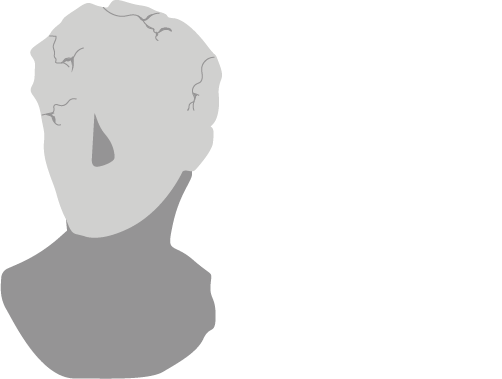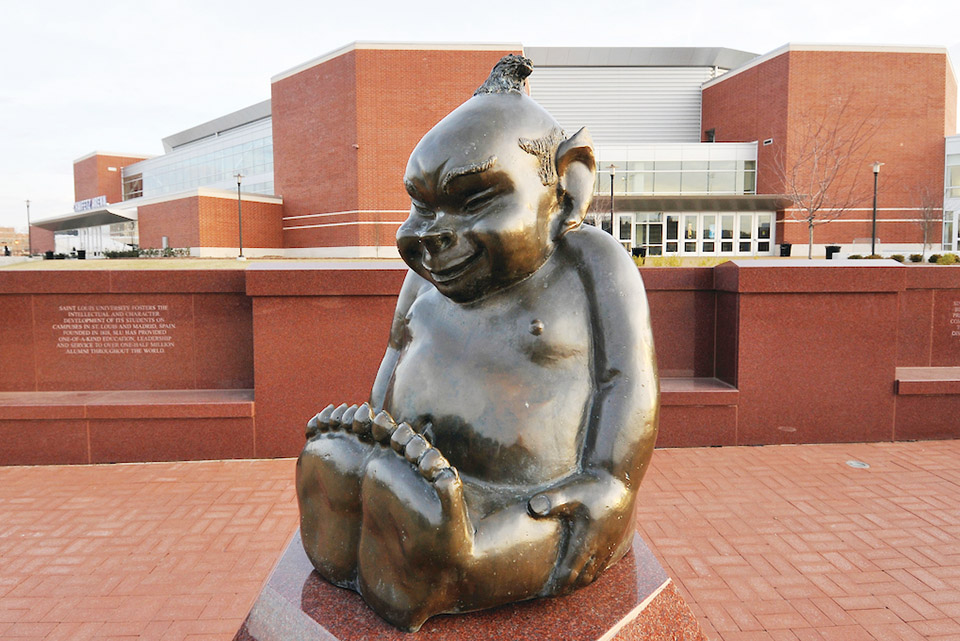
“What’s your major” is a question I have come to dread. I usually respond with “I’m majoring in History and English, and minoring in Philosophy and Latin, but only because I want to go to law school, and they usually like diverse majors.” Sometimes I follow this marathon of a sentence with an uncomfortable laugh, as if asking people to forgive me for my choice of study. Why does this question make me uncomfortable? Why is there an underlying shame surrounding the incredibly interesting disciplines that I chose to study? Why do I feel the need to justify my choice by explaining to others what post-grad path I intend to follow?
I recall when I explained this to Dr. Evans, an English professor at SLU, she stated firmly, “There has to be support across the university for students to feel safe. You should feel proud of your major.” This incredibly simple sentence was the first time that someone validated my choice of study. In fact, my experience explaining my major was usually less than validating. I still remember an old co-worker’s reaction when I told him my majors. It feels like yesterday that the blood rushed to my face when he laughed and said “What, are you trying to work at this coffee shop forever?” Though not everyone is as forward as my former co-worker in their disdain for the humanities, it was not the first nor the last time that a student like myself has been a victim of the negative stigma that surrounds the humanities.
Humanities majors even at the most prestigious of academic institutions, fell victim to untrue stereotypes and stigma. Author Nathan Heller wrote an article for the New Yorker entitled “The End of The English Major,” in which he interviewed various students from Harvard to get their perspective on how humanities are studied at a school that shines as the beacon of intellectual achievement. Isabel Mehta, a Harvard junior, stated “I would never say this to any of my English friends, but I kind of thought those majors were a joke.” The understanding I personally hold of humanities courses repeatedly conflicts with the negative opinions held by many other students, and it made me once again wonder why. Why does this stigma exist?
The study of English has given us our most influential authors, it has allowed for greater communication and has allowed some of the most intelligent and creative thinkers to have a platform. English has given us everything from “All the worlds a stage, and all the men and women merely players,” by William Shakespeare in “As You Like It” to Ronald Regan’s Brandenburg Address, in which he stated “Mr. Gorbachev, tear down this wall!” Furthermore, the study of Philosophy teaches people to think critically and gives us a different way to examine history. Why is the history we study today the way it is? Is the past random? A mixture of theology and philosophy would examine whether a God has set up history to happen in a certain cause-effect way, therefore leading students to tackle issues such as good versus evil, and whether or not God exists as an omnipotent, omniscient being. As I grappled with my confusion, Hellar’s article pointed me towards one’s background, and parental influence, as potential causes for why students tend to stray away from the humanities and perpetuate negative, untrue stereotypes regarding these majors.
Harvard graduate Justin Covach explained how her parents, being low-income immigrants, heavily influenced her choice not to study English, even though she loved it and was an avid reader: “My first issue as a first-gen student is: I have always viewed humanities as a passion project. You must be affluent in order to be able to take that on,” said Covach. Another student, Rebecca Cadenhead, echoed Covach’s grievances. “People in the [humanities] group are from the Northeast, are usually upper middle class, are usually white,” said Cadenhead.
Given that I checked each privileged box put forth by Cadenhead, I was unsettled. The idea that the humanities might not be as inclusive to people of color was not something that had occurred to me as a possible reason for the 17% decline in humanities enrollment over the past decade. Cadenhead further went on to explain how people of color at Harvard fear judgment on a magnified scale, when compared to their white counterparts.
A concern that people of color feel is that they will be perceived as less academic if they choose to study humanities, which is part of the reason that they are drawn more toward the sciences, “they think they’ll be perceived as more intelligent if they do,” said Cadenhead. This was the first time I realized that stigma existed for my peers in a way that I could not understand. Furthermore, since paying for an undergraduate degree is extremely difficult for low-income students, the fact that acquiring a higher-paying job with a humanities major commonly requires a doctorate degree, becomes an impossible prospect.
While humanities majors are likely to earn high salaries after graduate school, engineering majors are most likely to be earning that same, or higher, directly after obtaining a bachelor’s degree. In fact, according to a CNBC article published on Feb. 23, 2023, entitled “Highest-Paying College Majors, Five Years After Graduation,” eight of the majors listed were engineers, and the other two were also STEM. When faced with such bleak statistics, it is no wonder that students who do not have access to unlimited financial opportunities are drawn towards STEM majors, often due to pressure from their families or intermixed with their identity as first-generation or students of color. Similarly, another CNBC article went on to detail the 10 worst paying college majors five years after graduating. I remember being disappointed but unsurprised as I examined the list that included majors such as Theology, Foreign Language, English and more. However, the situation may not be as bleak as these articles make it seem.
On a sunny October afternoon, I was able to talk to Dr. Parker, a history professor at SLU, and one thing he said really stuck out to me “I think there has always been a sense that with an engineering degree, you are going to make a lot more money than if you have a history degree. That’s a misperception. After about 10 years, humanities majors make as much as students going into almost any other profession.” Though I was initially skeptical of this statement, I found that Dr. Parker was right. In the New York Times article “In The Salary Race, Engineers Sprint but English Majors Endure,” author David Demming pointed out how, “By age 40 the earnings of people who majored in fields like social science or history have caught up [to STEM majors].” Demming goes on to point out how the average social science and history major will be earning around $131,154 at the age of 40, which is about $20,000 dollars ahead of the average salary of all college graduates. The skills that those majoring in humanities are incredibly employable, or as explained by Dr. Evans, “humanities majors are highly in demand because of their writing skills, their argumentative skills, their researching skills and their ability to recognize bullshit.”
Furthermore, though STEM can provide job security following undergrad, Demming explains how “many of the last technician skills that are in high demand today become obsolete when technology progresses.” The allure of studying what is new and unknown through STEM is a huge part of its attraction, and part of the reason why universities put so much money into STEM. However, “skill turnover is much higher in STEM fields than in other occupations,” said Demming, this constantly forces those with careers in STEM to constantly adapt, or risk losing their job to someone who has graduated with an entirely new set of skills. In my lifetime, technology has progressed from flip phones to the iPhone 15 Pro Max, and this ever-evolving aspect of STEM is not something that those studying the humanities are faced with. It is true that we are constantly updating our understanding of history, poetry and philosophy, but in ways that build off – instead of compete with – each other. We do not view previous understandings or interpretations of history as less – than, or obsolete in comparison with our understanding today. However, in regard to technology, we view the power of a Blackberry as significantly less desirable than that of an iPhone.
Humanities may not have the flashy allure that STEM fields possess, but their importance in our society must not be undervalued. By studying the humanities, we learn about the world’s why and how. We are where we are today because of our past, because of the philosophical thinkers and authors that came before us. We will achieve incredible feats of human understanding in the future if we emphasize the importance of studying the humanities to the students of tomorrow.
To be clear, I am in no way trying to argue that we should study the humanities instead of STEM. That is part of the reason I was drawn to SLU’s mission of Cura Personalis, or care for the whole person, because I am drawn to a well-rounded education and the Jesuit values that SLU advertises. Part of the reason I was drawn to write this article is my fear that SLU is not living up to its mission, by not providing enough support to the faculty and students who study ancient languages, philosophy, religious ethics and English – all being Jesuit areas of study, feel the encouragement, support and recognition that their STEM counterparts feel.
As I was writing this article, I was able to interview many of the incredible professors here at SLU in the College of Arts and Sciences (CAS). Though the creation of the CORE was specifically designed to push students enrolled at SLU outside of their chosen majors, it might not be doing enough. Dr. Parker acknowledged that the university is a business, trying to do what it can to be economically sufficient, but at times it seemed to him to fall on the shoulders of professors to figure out the student market. This is contradictory to their interest and profession, being professors who should be primarily concerned with the education of the students they have. “Sometimes I think we could use a little more help,” Parker explained to me, and he was not the only professor who felt this frustration. Dr. Hart-Hasler, a Latin professor, whom I have the pleasure of taking two courses with, and one of the initial inspirations for this article, echoed this feeling. She explained to me and the three other students in our Latin class that every summer for the past seven years, she has received an email saying that her courses were under enrolled and that they would have to cancel them, and every single summer, she would have to negotiate to keep them. Many of these courses were often required for Latin and Greek majors, so it shocked me that Dr. Hart-Hasler had to advocate for them on a regular basis. When I talked to Dr. Evans, she very thoughtfully outlined ideas for how SLU, going forward could greatly support the mission of Cura Personalis, and also provide further support to the humanities department. She pointed out that one potential way to support SLU’s mission and promote the study of humanities was if more courses could be created that attract both STEM and humanities majors. She proposed teaching a gender studies course that examined gender as a biological category or combining critical theory with data and statistics. She also suggested that the CAS should consider hiring consultants to see how they can bring in more humanities majors, given that promoting the study of all subjects, including humanities, should be a main part of SLU’s mission as Jesuit university.
Part of the reason the humanities are undervalued in today’s society is because there is no way to quantitatively measure what humanities majors are learning. When you take a course in mathematics, or chemistry, you can understand what you learned quantitatively. You can measure your learning over the course of the class by saying “I learned A, how A correlates to B” and so on.T his level of structure is not present in an English class. Because of this, it becomes very difficult for humanities students to avoid feeling stagnant in their majors. In my opinion, in order for the humanities to be able to thrive as an area of study at SLU and nationwide, three things need to happen:
- Universities need to advertise the humanities to prospective students, by explaining that it is a complete misconception that those majoring in the humanities will lack well-paying jobs.
- More money needs to go towards funding the humanities departments. This money would support more faculty, more research, more creative outlets, more guest speakers, anything that builds conversation around the humanities.
- Humanities students need reassurance. They need to be told that it is not only ok to study the classics, but that in doing so, they are shaping the history books of tomorrow.
As a history major, I learned that after both World Wars, there was a massive spike in the study of the humanities, and it made me wonder if it takes a mass tragedy to reignite society’s interest in outside-of-the-box disciplines. Since the idea of a world war does not sound like an appealing way to reignite future student’s interest in the humanities, it is important that we find other ways to encourage students to take an interest and feel support if they choose to study history, English, theology, philosophy and more. Humanities majors teach you to examine your surroundings and think creatively. They teach students how to communicate, write, listen effectively, work well with others, analyze, contextualize and think creatively. When I searched on Google “SLU stem building” I saw articles praising SLU for their devotion to scientific research, as well as the many pre-college programs preparing STEM interested students for their future careers. An article written in 2019 by Cision PRNewswire detailed how SLU invested $50 million in the Interdisciplinary Science and Engineering building, as well as completing a $28.8 million renovation of Macelwane Hall, where biology and chemistry labs are placed. However, the story is different when you replace the term “STEM” with “humanities”. When you search humanities SLU building, the top search is a campus map. Until humanities students can stand next to flight science majors, who came to SLU specifically for the flight science program, and say, “I came to SLU because of the effort they put into their humanities classes,” SLU has not done enough to encourage the growth of the humanities department.








